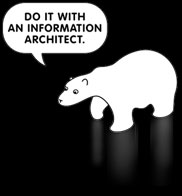5 Questions to Victor Lombardi

V
ictor Lombardi is the director of Smart Experience, an independent school based in New York City, he is teaching Business & Design at the Pratt Institute and he co-founded and served as president of the Information Architecture Institute. Victor also founded the management consulting firm MIG and worked at the Boston Consulting Group and others. He is a recognized thought leader in the field of information- and experience design. Victor blogs at Noise Between Stations. He is the Keynote speaker at the german IA Conference 2007 (9/10 November in Stuttgart).
Interview in deutsch
1. Victor, Information Architects as a species have entered the scene perhaps around 1998/99 (in the US, with the release of the PBB). Since then they have established themselves an important niche in the process of building websites and web applications or, in the realm of shared information environments, so to speak. "We" argued with designers and architects, with usability professionals, with developers and with clients. Did we miss the most important factor in the equation: business people and the management?
I'm actually impressed with how far we've come in understanding business. The dot come bust of 2000-2001 made it clear how important this is, and the community (at least those of us that had this need) responded by learning what we needed to know.
2. You have written "Great Process Leads to Great Products". How is the IA process changing now that everybody is moving from waterfall to agile? Does the overall IA process need any changes or adjustments?
Absolutely. We've become comfortable with a very basic user-centered design process and it's a de facto standard, but with agile and rich internet applications that process doesn't work well; the products are too complex to wait until a developer starts building to know if the design works. I think we'll see the need for less indirect design (like wireframes) and more direct design (prototyping).
3. We all know the famous three IA foci: user, content and business context. How well do Information Architects really need to understand the business site of this model? How deep do they need to dive into business models, ROIs and revenue streams?
Information Architects can't simultaneously become experts in their field and in finance and accounting. The reverse is also true: people trained in business can't also become experts in design. We need to collaborate. And to collaborate we have to know enough to understand each other, and build respect for each other. Therefore, we should become better at explaining what we do to business people -- now I think we spend too much time just talking to ourselves.
4. You have a lot experience in teaching. You give classes on Business & Design and have founded a school in New York City aimed at working professionals in the Internet and software domain. What do you think should a course of studies (let's say a two years postgraduate program) contain to enable it's students to acquire the hypothetical degree Master of Information Architecture and User Experience?
I'm not sure if the traditional model of going to school for two years will help students keep up with the rate of change in our field. Our field is a craft that also involves theory, comparable in this way to medicine. So we might look at that model for inspiration.
I see three major periods to such an education:
- a period of time when we learn theory
- an internship where we learn the craft
- an ongoing process of continuing education throughout our careers
5. Victor, at the german IA Konferenz 2007 there will be three workshops held in english - yours: "Using Internet Business Strategy", Thomas Vander Wal's: "Building a Foundation for Tagging and the Social Web" and Jess McMullin's: "The Business of Experience" (see the program, PDF). Do you think, for an local community like the german IA community for example, is it a blessing or a curse to have to deal with more then one language? Talking to german clients for example one can use a perhaps established english term or a sometimes cumbersome german alternative...
As a native English speaker it's hard for me to know. But Germans have a great engineering tradition, and I'm told this is partly due to having precise language with which to describe engineering concepts. In Information Architecture there isn't yet much agreement on many terms, so why don't Germans take the lead and suggest more precise language?





